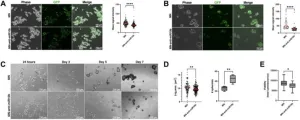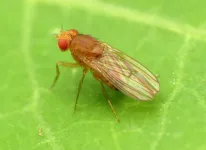“What is so exciting—and so challenging—about being a postdoc is that you’re called to take what you know and apply it to a new problem,” said Damon Runyon Fellow Georgia R. Squyres, PhD. “When you’re stepping out into open space like that, it’s important to feel that you have a net of support under you. The Damon Runyon Fellowship lets us take that leap.”
“We are thrilled to be funding these innovative, young scientists with the brilliance and passion to push boundaries and make breakthroughs. Damon Runyon Fellows are the future leaders of their respective fields,” said Yung S. Lie, PhD, President and CEO of Damon Runyon.
Spring 2024 Damon Runyon Fellows
Layla J. Barkal, MD, PhD, with her sponsor Michael A. Fischbach, PhD, at Stanford University School of Medicine, Stanford
The bacterium Staphylococcus epidermidis (S. epi) is nearly universally present on human skin, and certain strains are capable of eliciting immune responses that can be redirected against tumor antigens. Dr. Barkal is investigating how to harness the immunomodulatory properties of S. epi to develop a new class of T cell immunotherapy that is potent and tumor antigen-specific, avoiding the systemic side effects associated with current immunotherapies. Specifically, she is using a melanoma model to explore how to modulate T cell production with S. epi and how to use other skin bacteria for synergistic anti-tumor effects. This work will form the foundation for human trials of topical bacteria-based cancer immunotherapy. Dr. Barkal received her MD, PhD from University of Wisconsin-Madison, Madison and her BS from Massachusetts Institute of Technology, Cambridge.
R. Camille Brewer, PhD [HHMI Fellow], with her sponsor Gregory M. Barton, PhD, at University of California, Berkeley
B cells, especially those that target cancer antigens, are crucial for fighting tumors; however, not everyone develops them. Our gut bacteria play a vital role in training B cells to recognize a wider range of threats. Dr. Brewer’s research explores how these gut bacteria influence the specificity of B cells, and thus our body’s ability to combat tumors. Dr. Brewer’s research aims to determine if the “training” of B cells by gut bacteria early in life influences their later responses to vaccines and cancer. This investigation may not only improve our understanding of how gut bacteria shape our immune system, but also pave the way for novel cancer treatments utilizing gut bacteria. Dr. Brewer received her PhD from Stanford University, Stanford and her BS from Massachusetts Institute of Technology, Cambridge.
Michael V. Gormally, MD, PhD [Dennis and Marsha Dammerman Fellow], with his sponsors Christopher A. Klebanoff, MD, and Michael F. Berger, PhD, at Memorial Sloan Kettering Cancer Center, New York
Adoptive cell therapy (ACT) is poised to expand the curative potential of immunotherapy. ACT works by administering T cells that have been genetically engineered to express tumor-specific T cell receptors (TCRs) so that they recognize a particular cancer antigen. Dr. Gormally’s work addresses two major challenges that currently limit the effectiveness of ACTs against solid tumors: identifying antigen targets that can be recognized by the immune system, and designing TCRs that target those antigens with exquisite specificity. Dr. Gormally and his colleagues have identified multiple immunogenic antigens derived from cancer-causing mutations and developed a powerful approach to retrieve potent, antigen-specific TCRs from large libraries of blood samples from cancer patients. The goal of these efforts is to identify safe and effective TCRs for clinical application. Dr. Gormally received his PhD from the University of Cambridge, Cambridge, his MD from Yale School of Medicine, New Haven, and his BA from Pomona College, Claremont.
Chaiheon Lee, PhD [Suzanne and Bob Wright Fellow], with his sponsor Amit Choudhary, PhD, at the Broad Institute (Eli and Edythe L. Broad Institute of MIT and Harvard), Cambridge
The immune system has the capability to destroy cancer cells harboring mutated genes. Cells display peptides derived from these mutated genes (i.e., portions of the mutant protein) on a molecule called the major histocompatibility complex I (MHC I), triggering cytotoxic T cells to eliminate the cancer cells. Unfortunately, this surveillance system is weak and often subverted by cancer cells. Dr. Lee aims to enhance the immunogenicity of the MHC I-displayed peptides using haptens, small molecules that elicit an immune response when attached to a larger carrier protein. By empowering the immune system, he envisions that these hapten-protein complexes will enable the repurposing of cancer drugs for which resistance has emerged. Dr. Lee received his PhD and BS from the Ulsan National Institute of Science and Technology, Ulsan.
Expery O. Omollo, PhD [Robert A. Swanson Family Fellow], with his sponsor Gene-Wei Li, PhD, at Massachusetts Institute of Technology, Cambridge
Dr. Omollo studies how bacteria have evolved to achieve precise gene expression using strategically placed transcription terminators. In cancer cells, specific mutations lead to uncontrolled transcription of certain genes, resulting in elevated gene expression that fuels cancer progression. Using bacteria as a model, Dr. Omollo aims to uncover how RNA polymerases in cancer cells evade termination signals to maintain high levels of gene expression, encouraging cancer spread. Dr. Omollo received his PhD from University of Wisconsin-Madison, Madison and his BS from Michigan State University, Lansing.
Sangwoo Park, PhD [Merck Fellow], with his sponsor Marcela V. Maus, MD, PhD, at Massachusetts General Hospital, Boston
One way cancer cells evade immune attack is by constructing a thin material barrier called the glycocalyx on their surface to evade detection and destruction by surveilling immune cells. Tiny changes in the glycocalyx thickness, as small as 10 nanometers, can affect the anti-tumor activity of immune cells, including CAR T cells. Dr. Park’s goal is to develop strategies to endow CAR T cells with the ability to penetrate the glycocalyx barrier in solid tumors such as breast cancer and glioblastoma. These strategies will increase the effectiveness of CAR-T cell therapy against solid tumors by overcoming a significant mechanism of immune cell evasion. Dr. Park received his PhD from Cornell University, Ithaca and his BS from Korea Advanced Institute of Science and Technology, Daejeon.
Sarah L. Price, PhD [Merck Fellow], with her sponsor Eric P. Skaar, PhD, at Vanderbilt University Medical Center, Nashville
Emerging evidence implicates the pathogenic bacterium C. difficile as an initiator of colorectal cancer. C. difficile exposure can lead to chronic recurrent disease that is difficult to clear with antibiotics. The generation of spores is a well-studied mechanism used by C. difficile to persist; however, other mechanisms of recurrent infection remain poorly understood. Dr. Price hypothesizes that biofilms may function as reservoirs of C. difficile and aims to elucidate their role in disease relapse. She will employ innovative imaging strategies to visualize the composition and development of C. difficile biofilms in the gastrointestinal tract, with the goal of generating insight that will improve treatments for C. difficile infections and identify strategies to prevent colorectal cancer. Dr. Price received her PhD from University of Louisville, Louisville and her BS from University of Tennessee, Knoxville.
Nalin Ratnayeke, PhD [HHMI Fellow], with his sponsor Scott W. Lowe, PhD, at Memorial Sloan Kettering Cancer Center, New York
Pancreatic cancer is a leading cause of cancer-related deaths. The development of drugs targeting mutant KRAS, the oncogenic driver of most pancreatic cancers, has led to much optimism for improved treatments. However, tumor recurrence driven by heterogeneous cancer cell responses to these drugs remains a major challenge. Some cancer cells die, while surviving cells can halt their proliferation or continue to proliferate in the presence of drug, all of which can occur within the same tumor and dictate the overall response to treatment. Dr. Ratnayeke is studying the mechanisms that underlie these heterogeneous responses using mouse models of pancreatic cancer and single-cell genomics to map cellular states to their drug responses. Understanding these mechanisms will inform combination and precision therapies with mutant KRAS-targeting drugs to tune tumor responses in beneficial directions. Dr. Ratnayeke received his PhD from Stanford University, Stanford and his BS from the University of Texas at Austin, Austin.
David S. Roberts, PhD [Connie and Bob Lurie Fellow], with his sponsor Carolyn R. Bertozzi, PhD, at Stanford University, Stanford
Cancer immunotherapies have shown remarkable benefits, but many tumors remain unresponsive to existing treatments. The mechanisms cancer cells use to evade immune responses during treatment remain largely unknown. Altered cell surface glycosylation, the process of attaching sugars to cell surface biomolecules, is a hallmark of many human cancers. The interaction between cell surface glycoproteins on immune cells with cancer cells represents a major axis of immune evasion and plays a vital role in how cancer cells suppress immune responses during cancer treatment. Dr. Roberts’ research aims to molecularly define cell surface glycosylation and understand the role of glycosylation in driving cancer immunosuppression. This knowledge will be leveraged to illuminate the underlying mechanisms of tumor immune evasion and enable next-generation classes of cancer immunotherapies. Dr. Roberts received his PhD from University of Wisconsin–Madison, Madison and his BS from University of California, San Diego.
Ian J. Roney, PhD [HHMI Fellow], with his sponsor Michael T. Laub, PhD, at Massachusetts Institute of Technology, Cambridge
Bacteria have diverse immune systems to defend themselves against viral invaders, many of which use molecular mechanisms also seen in mammalian immune systems. Dr. Roney studies how bacterial immune systems detect virally compromised cells, and how viruses undermine immune systems to prevent the elimination of virally compromised cells from the population. The goal of his research is to uncover novel mechanisms and principles of immune systems that are found across domains of life. The discoveries resulting from this work will broaden our understanding of how immune systems detect and eliminate compromised cells, like cancer cells, and could help guide development of new immunotherapies. Dr. Roney received his PhD from Harvard University, Cambridge and his MS and BS from University of Ottawa, Ottawa.
Rocío D. M. Saavedra-Peña, PhD [HHMI Fellow], with her sponsor Stephen D. Liberles, PhD, at Harvard Medical School, Boston
Before, during, and after a meal, complex signals in the gut must be communicated to the brain to regulate physiology and behavior. Dr. Saavedra-Peña is researching how sensory neurons in the gut detect mechanical stretch, a potent satiety signal after a meal. Although vagal neurons, the primary component of the parasympathetic nervous system, are known to play a role in gut mechanosensation, the contribution of other neurons and mechanoreceptors are still unclear. Since disruptions in gut-brain communication can lead to obesity, metabolic disorders, and increased cancer risk, identifying the key cellular and molecular players in gut mechanosensation will aid in developing new treatments for metabolic disorders and provide a foundation for investigating the function of these circuits in gastric cancers. Dr. Saavedra-Peña received her PhD and MS from Yale University, New Haven and her BS from the University of Puerto Rico-Mayagüez, Mayagüez.
Yoshiki Sakai, PhD [Rhee Family Fellow], with his sponsor David Bilder, PhD, at University of California, Berkeley
Normally, epithelial tissues, which cover all external body surfaces and line internal cavities, expel unwanted cells to maintain health in a process known as cell extrusion. However, some cancer cells, particularly those with the common RasV12 mutation, manage to avoid extrusion. Using Drosophila (fruit flies) as a model, Dr. Sakai will explore how RasV12-mutant cells manipulate neighboring cells to avoid extrusion. Understanding this process could lead to new ways to prevent cancer cells from escaping the epithelial defense, offering potential new treatments. Dr. Sakai received his PhD and BS from Nagoya University, Nagoya.
Wenzhi Song, PhD [HHMI Fellow], with her sponsor Elaine Fuchs, PhD, at The Rockefeller University, New York
The interaction between cancer cells and their non-malignant neighbors in the tumor microenvironment is critical for cancer progression. While certain types of cellular crosstalk within the tissue safeguard against malignancy, cancer cells are often able to exploit nearby cells to fuel tumor growth. Dr. Song is interested in understanding how the complex cellular communication network in the skin, namely its sensory and immunological components, contributes to the development of cutaneous squamous cell carcinoma, one of the most common skin cancers. Identifying novel neuronal and immunological interactions within the tumor microenvironment has the potential to uncover pathways regulating cancer progression and anti-tumor immunity. Dr. Song received her PhD from Yale University, New Haven and her AB from Bryn Mawr College, Bryn Mawr.
Simon Sretenovic, PhD [Connie and Bob Lurie Fellow], with his sponsor Lars M. Steinmetz, PhD, at Stanford University School of Medicine, Stanford
More than one third of all people will receive a cancer diagnosis at some point in their lifetime. Dr. Sretenovic is using both yeast and human cell lines to model various properties of cancerous cells as complex genetic traits. Combining novel CRISPR genome editing approaches with next-generation sequencing technology, he aims to dissect the intricate relationships between genetic variants, chemical and physical environmental factors, and phenotypic outcomes (i.e., observable characteristics). The goal of his project is to understand the genetic basis for a panel of cancer-related traits to inform the development of anti-cancer treatments. Dr. Sretenovic received his PhD from the University of Maryland, College Park, and his MS and BS from University of Ljubljana, Ljubljana.
Jinchun Wu, PhD [Marion Abbe Fellow], with her sponsor Don W. Cleveland, PhD, at University of California, San Diego
Genome rearrangements have been widely observed in human cancers. Recent whole-genome sequencing data has identified chromothripsis, an event that introduces massive genome rearrangements in only one or a few chromosomes through catastrophic shattering and random reattachment, as one of the most frequent genome rearrangements. Chromothripsis has been associated with poor clinical outcomes in multiple cancers, but the shattering mechanisms that induce chromosome fragmentation remain uncharacterized. Dr. Wu aims to determine the role of cytoplasmic nucleases (enzymes that cleave DNA) in chromosome shattering and genome rearrangement, which will contribute to our understanding of chromothripsis in all cancers. She will extend this project to a mouse model of glioma to determine the effects of candidate nucleases on cancer progression. Dr. Wu received her PhD and BS from Peking University, Beijing.
Cheng Yang, PhD, with his sponsor Christopher J. Chang, PhD, at Princeton University, Princeton
Protein oxidation occurs when an amino acid gains an oxygen atom in a post-translational modification. Oxidation of the amino acid methionine plays an important role in cellular regulation, and mutations at methionine sites are known to have pathogenic effects in cancer. However, direct assessment of methionine’s oxidation product, methionine sulfoxide, remains underexplored. Dr. Yang aims to develop methionine sulfoxide labeling approaches using light or electricity. With the help of these chemical tools, he will profile and identify methionine sulfoxide sites in pancreatic tumors and study their role in metastasis. Dr. Yang received his PhD from the University of Michigan, Ann Arbor and his BS from Naikai University, Tianjin.
END



